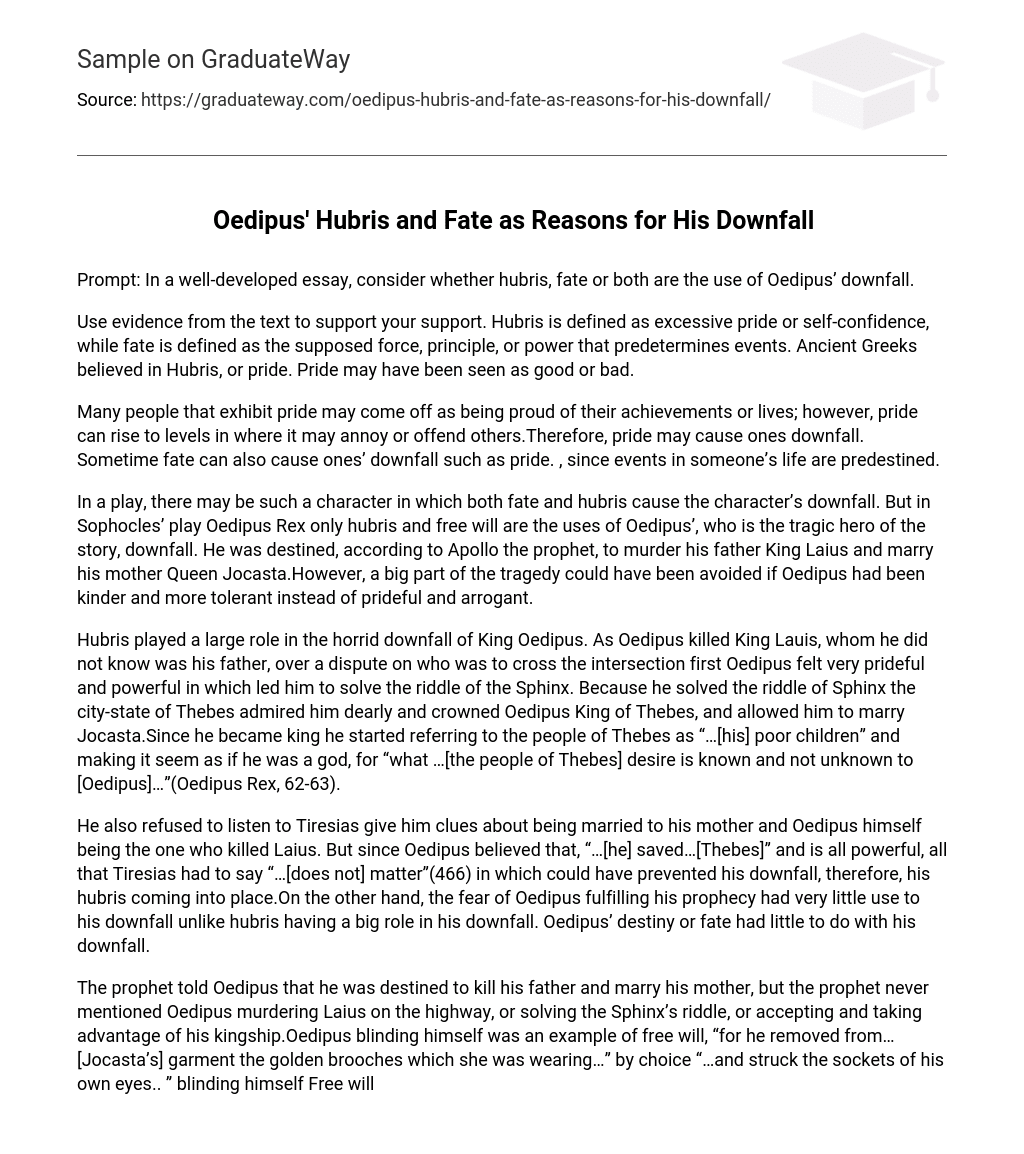Prompt: In a well-developed essay, consider whether hubris, fate or both are the use of Oedipus’ downfall.
Use evidence from the text to support your support. Hubris is defined as excessive pride or self-confidence, while fate is defined as the supposed force, principle, or power that predetermines events. Ancient Greeks believed in Hubris, or pride. Pride may have been seen as good or bad.
Many people that exhibit pride may come off as being proud of their achievements or lives; however, pride can rise to levels in where it may annoy or offend others.Therefore, pride may cause ones downfall. Sometime fate can also cause ones’ downfall such as pride. , since events in someone’s life are predestined.
In a play, there may be such a character in which both fate and hubris cause the character’s downfall. But in Sophocles’ play Oedipus Rex only hubris and free will are the uses of Oedipus’, who is the tragic hero of the story, downfall. He was destined, according to Apollo the prophet, to murder his father King Laius and marry his mother Queen Jocasta.However, a big part of the tragedy could have been avoided if Oedipus had been kinder and more tolerant instead of prideful and arrogant.
Hubris played a large role in the horrid downfall of King Oedipus. As Oedipus killed King Lauis, whom he did not know was his father, over a dispute on who was to cross the intersection first Oedipus felt very prideful and powerful in which led him to solve the riddle of the Sphinx. Because he solved the riddle of Sphinx the city-state of Thebes admired him dearly and crowned Oedipus King of Thebes, and allowed him to marry Jocasta.Since he became king he started referring to the people of Thebes as “…[his] poor children” and making it seem as if he was a god, for “what …[the people of Thebes] desire is known and not unknown to [Oedipus]…”(Oedipus Rex, 62-63).
He also refused to listen to Tiresias give him clues about being married to his mother and Oedipus himself being the one who killed Laius. But since Oedipus believed that, “…[he] saved…[Thebes]” and is all powerful, all that Tiresias had to say “…[does not] matter”(466) in which could have prevented his downfall, therefore, his hubris coming into place.On the other hand, the fear of Oedipus fulfilling his prophecy had very little use to his downfall unlike hubris having a big role in his downfall. Oedipus’ destiny or fate had little to do with his downfall.
The prophet told Oedipus that he was destined to kill his father and marry his mother, but the prophet never mentioned Oedipus murdering Laius on the highway, or solving the Sphinx’s riddle, or accepting and taking advantage of his kingship.Oedipus blinding himself was an example of free will, “for he removed from…[Jocasta’s] garment the golden brooches which she was wearing…” by choice “…and struck the sockets of his own eyes.. ” blinding himself Free will and hubris, according to the ancient Greeks, were separate from unavoidable fate.
Oedipus’s fate was to kill his father and marry his mother. However, everything else, including fleeing Corinth, solving the Sphinx’s riddle, and finally pursuing the truth about his life, was by his own free will, a direct result of his ego and pride.Oedipus Rex is a story about the dangers of pride and arrogance, one teaching about the importance of humility and tolerance, and one stressing about the control of hubris, a potentially perilous quality that destroyed Oedipus’s vision and his life. Read more: http://bookstove.
com/drama/oedipus-and-hubris/#ixzz2HFzedWXu. All of these things were done by Oedipus’ own will not by fate and could have been completely avoided if he did not take these actions. Thus, ultimately leading to his heartbreaking downfall. Because hubris and free will were both big roles in the play Oedipus Rex by Sophocles, they both majorly led to his downfall.
According to the ancient Greeks, free-will and hubris were separate from unavoidable fate. Oedipus’s fate was to kill his father and marry his mother. However, everything else, including fleeing Corinth fearing the prophecy, solving the Sphinx’s riddle, and finally pursuing the truth about his life, was by his own free will, and an unfortunate result of his ego and pride. Oedipus Rex is a story about the dangers of pride and arrogance, and one stressing about the control of hubris, a potentially dangerous quality that destroyed Oedipus’s vision and his life.





